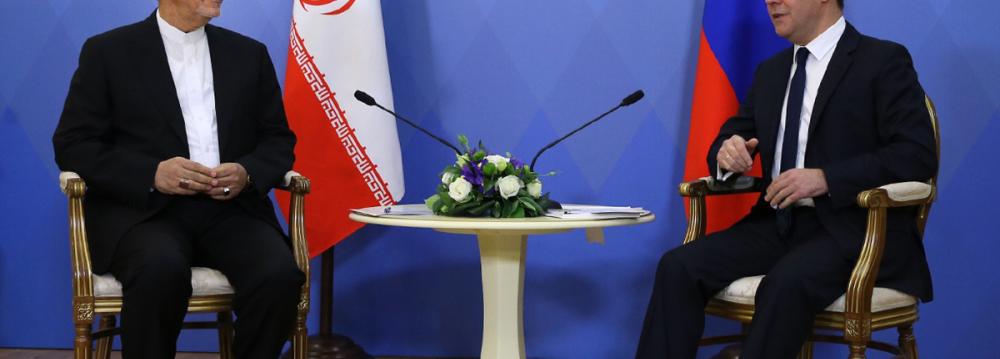Russian Prime Minister Dmitry Medvedev predicted a bright future for Russia-Iran ties, saying bonds of friendship are being strengthened through mutually beneficial cooperation in various fields.
"Close relations have been established between the two states in various sectors and bilateral collaboration will be developed," TASS news agency quoted him as saying.
Medvedev was speaking in a Thursday meeting with Iran's First Vice President Es'haq Jahangiri who was visiting the Russian Black Sea resort of Sochi to participate in the 16th meeting of the Council of Heads of Government of Shanghai Cooperation Organization.
The Russian premier hailed closer contacts between the two countries in recent years, saying his meeting with Jahangiri was a good opportunity for discussing how Tehran-Moscow collaboration was developing, particularly in the economic fields.
"Our countries have established a diversified dialogue," he said, pointing to frequent meetings between Russian President Vladimir Putin and his Iranian counterpart Hassan Rouhani, who have sat down for talks 12 times in the past four years.
Medvedev also said Russia sees no obstacles to Iran joining SCO.
"We will work to prepare the ground for Iran to join the bloc," IRNA quoted him as saying.
Iran holds observer status in the security bloc since 2005, along with Afghanistan, Belarus and Mongolia, and has declared its willingness to become a full-fledged member.
India and Pakistan officially joined the bloc earlier this year, in its first expansion in 16 years after its 2001 creation by China, Russia and four ex-Soviet Central Asian republics of Kazakhstan, Uzbekistan, Tajikistan and Kyrgyzstan.
Model of Cooperation
The vice president said he is pleased with close cooperation between Russia and Iran against terrorism, saying it can be a model for the world.
"Our anti-terror collaboration, especially in Syria, is an example to be followed in the fight against terrorism at the global level," he said.
Jahangiri said he hopes the two countries' cooperation with Turkey to prepare the ground for a political settlement of the Syria conflict could bring an end to the sufferings of the Syrian people and help promote peace in the chaotic region.
Russia entered the conflict in Sept. 2015 by lending its air strength to the Syrian Army, joining Iran who was providing the anti-terror drive in Syria with advisory assistance since the early months of the over six-year crisis.
A godsend for Syrian troops, the Russian airpower helped them achieve back-to-back victories over militants wreaking havoc on the Arab country.
Since late 2016, when the liberation of Aleppo effectively drove the final nail in the coffin of regime change dreams in Syria, Tehran and Moscow started working with Ankara, a staunch backer of the Syrian government's opponents, to produce a political settlement for the conflict.
They have maintained a ceasefire covering most of Syria and are preparing to set up four de-escalation zones in militant-held areas of the country.
The three countries agreed in their last meeting, which brought together their presidents, to make preparations for holding a national dialogue congress, which will bring to the table both the Syrian government and various opposition groups willing to enter into talks with Damascus.
The collapse of the self-styled Islamic State terrorist group and the relative calm in the Arab country has raised hopes for an end to the worst manmade calamity of the 21st century.


